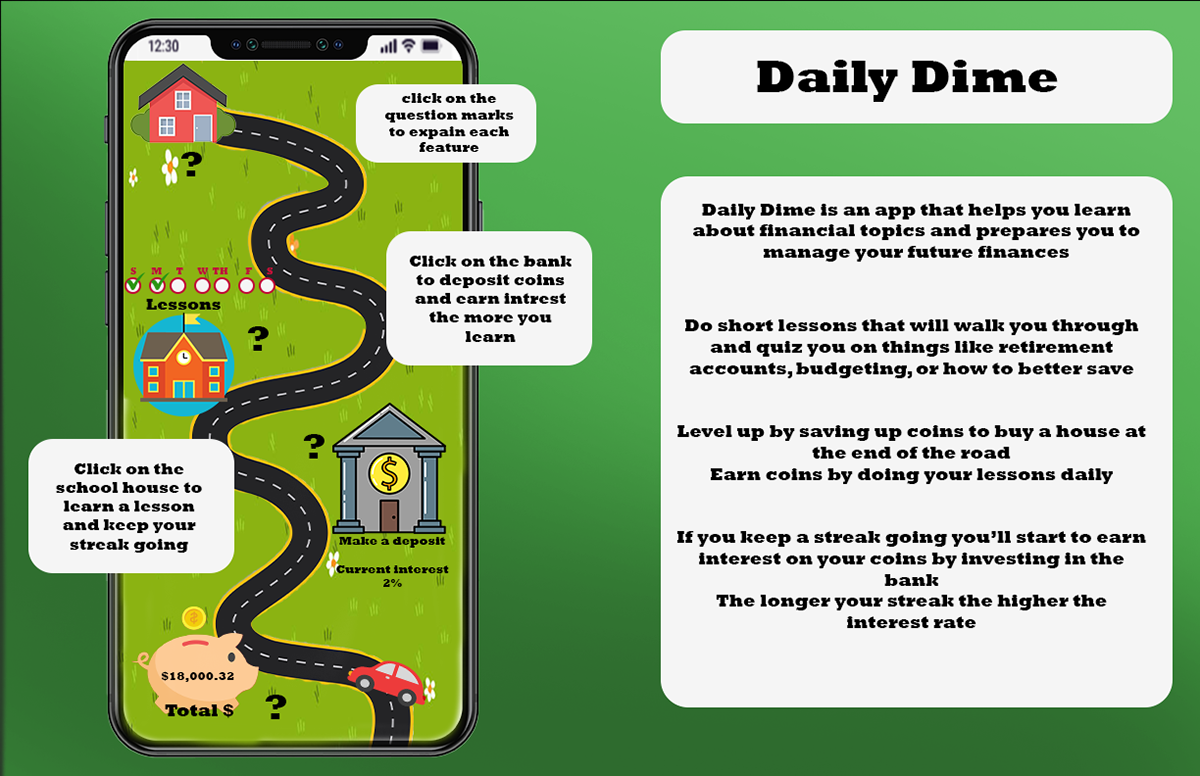Introduction
As a player in Finnegan’s Finances, you will set sail with your first mate, Finnegan, and explore the seven seas of financial literacy. You will embark upon quests and manage your pirate crew to help you learn the basics of finance. Each of the seven seas has a sea monster that will test you on what you’ve learned. Players earn in-game and real-life bonuses for completing daily streaks and visiting Huntington locations. This game will expose players to financial concepts so that when they encounter challenging financial decisions in real life, players will be prepared.
Arrrrrgh are yee ready to set sail?!
Arrrrrgh are yee ready to set sail?!
Secondary Research Summary
There’s a lot of misleading advice out there about finances and classical education doesn’t seem to be doing enough to make sure Gen Z students are financially literate. Given that Gen Z students are coming out of college financially illiterate and given the fact that Gen Z spends a lot of time playing video games. How can financial institutions and banks use gamification tactics to educate Gen Z so they feel confident in their finances?
Design Conjectures
Used conjectures to explore the concept of games + finance

Primary research methods
-3 in person interviews [15min each]
-Survey
-Brainstorm session
-3 in person interviews [15min each]
-Survey
-Brainstorm session
Participants were asked “What do you love most about your favorite video game?”
Significant quotes from interviews:
“I have learned more about economics from Civilization 5 (CIV) than any other college-level course I’ve taken.”
“getting into and learning the nitty-gritty details of road planning”
These quotes worked as the inspiration and groundwork for the rest of my project. My main take away was that games with complex information are appealing. Knowing this was important in trying to teach complex financial topics through a game.
Secondary Research Analysis
Gen z is financially illiterate
Spending a lot of time gaming
There’s an opportunity in gaming to help educate Gen Z about finance
Gen z is financially illiterate
Spending a lot of time gaming
There’s an opportunity in gaming to help educate Gen Z about finance
Each participant picked a game and a financial topic and had ten minutes to sketch ideas that used that game to communicate their given financial topic.
Further Ideation
Solution:
Finnegan’s Finances uses some basic game mechanics to help teach basic financial topics. The core features of the game help teach budgeting, and spending.
Finnegan’s Finances uses some basic game mechanics to help teach basic financial topics. The core features of the game help teach budgeting, and spending.
This pirate adventure rpg takes the complexity and intimidation of financial literacy and transforms it into a fun and engaging learning experience.
Gaming is becoming more mainstream and popular. Across every generation we see a rise in how many hours people are gaming per week. With Gen Z and millennials gaming the most.
Meanwhile, financial literacy among adults is low. Personal finances can often cause a lot of stress and anxiety. Learning the ins and outs of finance can feel overwhelming and intimidating.
Finnegan’s Finances is my proposed solution to this problem.
Meet your first mate, he will guide you along your journey and give you tips along the way
Here is where you can select what financial topic you wanna play and learn
The crew management feature helps the player learn the basics to managing a budget. You’ll assign each crew member to spend your gold on essentials and non essentials
Ship upgrades where you spend your earned gold, learn how to divide your income into essentials, non essentials and savings
The Captains log serves as an expense receipt and teaches how to keep track of all your spending
Select different mini games to learn different things about loans
This rpg will walk the player through what its like to apply for a loan
Given that there’s a lack of engaging financial education from banks how can design gamify a learning experience that is desirable to Gen Z and increases financial literacy, confidence and wellbeing?








